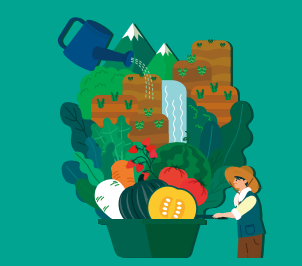
Today, the agriculture field is divided in many ways. It is not all about growing paddy fields under the hot sun or growing plants in a greenhouse. Due to the fact that many people are unaware of this reality, rural areas are gradually losing their significance. Following this trend, young people are leaving the rural areas to get a job in the city. Ironically, young people are the key for rural areas to become active and strong again. Here, you will find the stories of young rural workers based on their experiences, along with the explanations of agricultural institutions to revitalize the countryside in Jeollabuk-do.
Rural Working Program Gives New Option to Young People
Have you heard about the Jeollabuk-do Rural Areas Job Plus Center and the Rural Working Program? The center supports those who are job hunting in rural areas and connects them with institutions. It is also researching how to implement a job model suitable for rural areas. The Rural Working Program is the product of their research. Essentially, institutions that produce agricultural products in various parts of Jeollabuk- do, such as Iksan, Jeonju, and Gimje, or in other rural areas, participate in the program. Young people and college students who are willing to participate in the program choose two institutions they want to work for and fill out an application. This year, the program ran from July 3rd to July 7th, and it ran longer for some institutions depending on the situation.
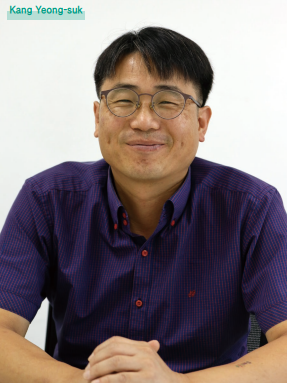
Kang Young-seok, the head of the center, said, “There are as many people living in rural areas as well as in cities, and each has various needs. In rural areas, movements to provide services and products are in place just like in cities, but city residents are typically unaware of this fact. I thought it would be a good idea to allow young people to experience diverse work in rural areas. In the case of countryside migration, there are many more conditions to consider, and it becomes more complex. However, it is much easier to live in a rural area and experience agricultural work for a short period of time.”
Kang explained how the program has changed from last year. This year, participants were given a chance to visit various agricultural sites. For example, participants who were working for an institution in Iksan also visited other institutions in Jeonju or Gimje to observe what activities were being carried out. “I want to broaden their horizon by giving them the chance to observe activities that they haven’t yet seen,” he added.
Lastly, he said he hopes the program will give young people an opportunity to live uncompetitive lives. “It has become mainstream to aim for city life, and we live competitively every day. We have to compete not only with others but even with ourselves. In a way, the rural lifestyle is such a breath of fresh air. Rural areas are completely different environments in which to live and work. Compared to cities, there are many ways in which life is uncompetitive. I hope that young people will realize that rural areas can also be an option in their lives through this program.”
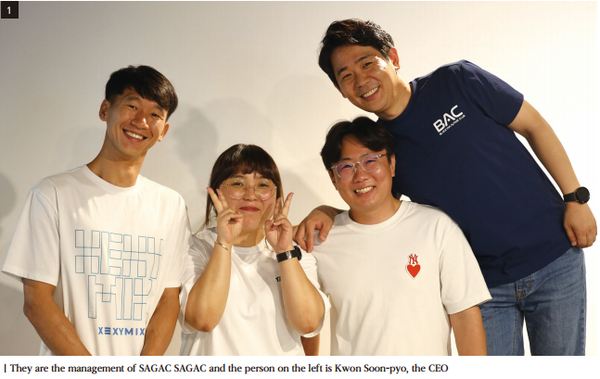
SAGAC SAGAC Advances Sustainable Communities
SAGAC SAGAC is a social enterprise that works toward a sustainable community that connects people, enables them to grow together, and creates a colorful environment without alienating anyone in the region. The name “SAGAC” contains the hidden meaning of bringing awareness to the vulnerable in the blind spots of society. By putting “SAGAC” as its name, the sound you hear when you first take a step on a snowy terrain, it aims to be a figurative signpost on a road that is the first of its kind. They are currently working in Iksan and have been participating in the Rural Working Program for three years.
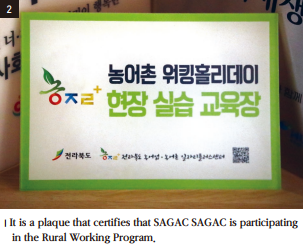
According to Kwon Sun-pyo, CEO of SAGAC SAGAC, a reason to participate in the Rural Working Program is as follows, “I know that college students who grew up in rural areas have a strong tendency to seek employment in other nearby cities or metropolitan areas after graduation. I want to let people know that various companies are actively working to revitalize rural areas, and that such companies are always opening their doors for the rural youth.” He added, “In the case of SAGAC SAGAC, since it is a company that focuses on carpentry, it is characterized by being able to access carpentry-related sites and experience activities that are not easily accessible. Because of this, many college students select it as the company of their choice every year during the Rural Working Program, which makes me very grateful.”
SAGAC SAGAC has also been selected for the Youth Village Development Support Project promoted by the Ministry of Public Administration and Security and has been running “Greencraftman town” for a year now. It is a village in Iksan where the environment and handicraft meet, and where young people become “green crafters”. Green crafter is a word coined by Greencraftman town. It refers to young people who have realized an eco-friendly lifestyle by producing and consuming products through small- scale and direct production to solve mass production problems.
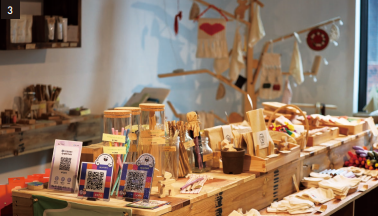
One of the highlights of the program is the uniqueness of the region and the place where excellent handicraft skills meet the environment. The purpose of this village is to make products that save and protect the environment through handicrafts, and turn them into a business model to lead to eco-startups and eventually to be reborn as an eco-friendly village. This year, various programs will be conducted so that young people can come to the region to stay and explore, understand current environmental issues, and brainstorm ideas that can lead to eco-friendly startups. In addition, various sustainability events such as environmental seminars, exhibitions, and environmental video screenings are planned there so that migrants and local residents can form networks and cultivate environmental sensitivity.
Furthermore, in order to revitalize the local community, SAGAC SAGAC plans to promote more activities that can communicate to young people through the medium of the environment. For example, along with the revitalization of Jungang-dong, the original downtown of Iksan, “Jungang Mention” is a place where people of various generations can gather and communicate. Jungang Mention is a name created by combining “Jungang” in Jungang-dong and “Mention” in English, with the hope that residents of Jungang-dong, both old and young, can gather and chance encounters occur.
CEO Kwon said, “I think our activities will be the most important and beneficial activities to revitalize the original downtown areas in depressed regions, going beyond environmental activities alone. It’s never easy for various generations of the region to naturally gather, mingle, and revitalize the region together, but SAGAC SAGAC will not stop until its aims are achieve like-minded people.
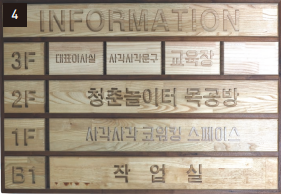
Three Students Talk about Enhancing Awareness of Young Rural Workers
In the second week of July, three college students who worked for SAGAC SAGAC commented on their experiences. Kim Yun-a is majoring in Business at Chosun University, Yu Ha- neul is majoring in Interior and Industrial Design at Wonkwang University, and Park Ye-eun is majoring in English at Dankook University.
They thought they would only make furniture from wood until they participated in other activities. Despite their expectations, they organized wood-related activities themselves, utilizing experience from their majors. They learned a variety of skills because they were building expertise, not just doing monotonous work. All three of them had the same opinion about the marketing for the Rural Working Program. Like the Rural Working Program, events that educate and support young rural workers are often not widely known. Most college students and young people are not aware of such opportunities. Therefore, active campaigning and marketing at the institutional or national level is essential.
Yu voiced her opinions. “When I heard the phrase young rural workers, I thought it mainly meant playing a role in growing agricultural products. However, when I came here and worked in person, I realized that planning programs to revitalize rural areas was also included in the work of being a rural worker.” Yu’s parents are farmers, and she grew up watching them and being aware of the reality of the countryside. Yu said, “In Korea, agriculture has been mainly handled by elderly farmers, but agriculture needs young people. They have a stronger labor force and longer working ability than elderly farmers.” For this reason, she foresees that if there continues to be a lack of young people in rural areas, the current problem will only worsen.

Young Rural Workers Disappear in Rural Areas
Currently, in the rural areas, it is difficult to find young rural workers due to the aging population and local extinction. As a result of the 2022 Agriculture, Forestry and Fisheries Survey, the proportion of the elderly population in rural areas (over the age of 65) was very high at 49.8% of all farms. Considering that the national average elderly population is currently at 18.2%, it can be seen that the aging phenomenon in rural areas is very serious. In addition, as of 2022, compared to the previous year, the farm household population by the age group of 70 years or older increased, while the farm household population aged 60 years or younger, including young rural workers, decreased. If this phenomenon continues, young workers will disappear from rural areas.
Change Your Awareness of Agriculture
The JBNU Globe met Na Sang-Su at the Young Farmers Fostering Division in RDA (Rural Development Administration) to listen about support for young rural workers. The RDA team was formed in July of 2021 to support developing techniques and stable settlements in rural communities.
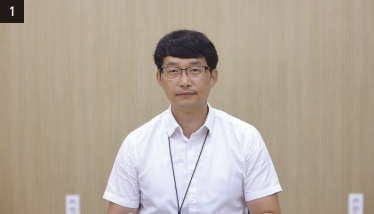
Recently, many unexpected events have occurred. For example, farm prices soared last year due to the war in Ukraine. This means it is imperative to produce and supply agricultural products domestically. Food weaponization may intensify across
the whole world. Therefore, fostering young rural workers is urgent to realize a sustainable agriculture industry and maintain stable food production. In Korea, the aging population rate is increasing while the birth rate is decreasing. Rural workers supply a vital function in every society. That is why, particularly in Korea, that young rural workers are currently in such high demand.
“We have to change our perception about agriculture,” Na stated. Agriculture has rapidly digitalized and mechanized in the era of the Fourth Industrial Revolution. Some people think that farming needs considerable manual labor, but modern farming is easier than in the past because of smart farming systems and mechanization. “I think there are still many negative views on agriculture. I hope people will start to recognize agriculture as a viable job and that more young people will enter the field. If you want people to change their minds, then help people to come into contact with agriculture more often.” Na also discussed the expansion policies in place and the implementation of secure residential infrastructures for the influx of young rural workers. Office workers earn money after their work is done and they live off of that money. However, agriculture requires much initial investment. For instance, fruit farmers may not make a profit until after three years. Securing more funds is necessary for rural workers to survive until they start making a profit. Luckily, RDA provides this type of support. Na also wants people who live in rural areas to enjoy the benefits of the city. “Young people living in the countryside need infrastructure for cultural life and to raise children well.”
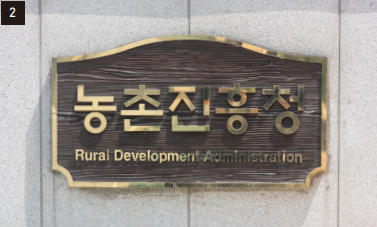
Jeollabuk-do Becomes Support Force for Young Rural Workers
For young rural workers, there is a lot of support in Jeollabuk-do. The Ministry of Agriculture, Food and Rural Affairs handles policies for the influx of young rural workers and the RDA manages young rural workers’ housing and career growth.
Na shared three representative policies in Jeollabuk-do. The first policy is about supporting those who settle in the provinces for agricultural work. This policy gives out about one million won for monthly living expenses. Rural workers under the age of 40 who are registered in agricultural management can receive this support, and four thousand people have received it thus far in 2023. The policy supports these young rural workers for three years, and gives 1.1 million won for the first year, one million won for the next year, and nine hundred thousand won for the third year. The next policy gives supporting funds for 41 to 50 year olds who are going to be rural workers. Agricultural work needs a lot of initial investment, so the policy provides up to five hundred million won. With these funds, young rural workers can purchase farmland and install facilities. The last policy is for renting out facilities and equipment to rural workers. This is a rental service to give young rural workers experience with growing various crops for three years. After this period, they can start farming with the crops that best suit them.
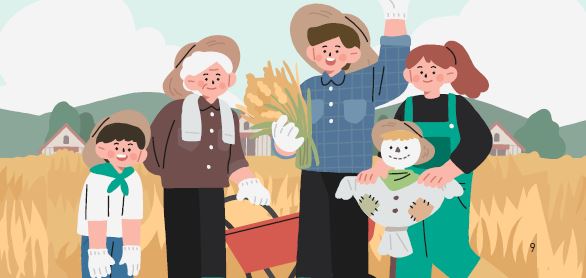
The RDA also provides various support to foster young rural workers. First, they support management consultation with experts in farming, cooperation management, and start-up related agriculture. Second, they offer customized information through a site operated by Young Farmers Fostering Division. This site is for young rural workers in the settlement stage and people who want to be rural workers. Third, they help these young rural workers to be professional. It operates through fostering coordinators in regional units and offers customized training for young rural workers. Fourth, they support the growth of technology by encouraging young rural workers’ participation in the R&D (Research and Development) of RDA. Lastly, they are cultivating 4-H for young rural workers, which is a group of young rural workers. This group has about eight thousand people enrolled in the country. Through the 4-H program, RDA is inducing networking for young rural workers, so they are putting these young rural workers into contact with a group of people who farm regional special crops.
To revitalize rural areas, young people play a pivotal role. Living in rural areas can also help young people to live an uncompetitive and more peaceful life. There are various opportunities for young people to become familiar with agriculture like the Rural Working Program, farming activities, etc. In addition, various institutions provide support to bring young people into rural areas and foster their development as rural workers. Why don’t you take this opportunity to learn more about agriculture? It is the foundation for each and every society.
| Ha Yae-one Editor, Jo Soo-jin Reporter, Park Mi-so Cub-Reporter

